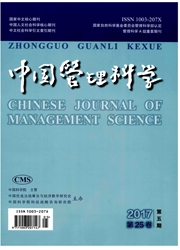

 中文摘要:
中文摘要:
本文以2005-2008年间我国752家上市公司为样本,借鉴现金流组合方法对上市公司所处生命周期进行界定,从企业生命周期的角度考察了不同性质的最终控制人控制权、现金流权及两权分离程度对公司价值的影响。研究发现,最终控制人控制权与公司价值负相关;而现金流权也与公司价值负相关,这与西方学者结论不同,主要是因为我国特殊的股权结构——第一大股东持有的股份多数为非流通股,导致了高现金流权并不能起到相应的激励作用;两权分离程度在成长期和成熟期越大会造成公司价值的降低,而在衰退期则有利于公司价值的提升;最终控制人为非国有性质的公司,相对于国有性质的公司在成长期和成熟期更有利于公司价值的提升,而衰退期则相反。
 英文摘要:
英文摘要:
The paper presents an empirical study based on a database of 752 listed companies from 2005 to 2008 in China.With the method of cash flow portfolio to classify the phases of enterprises' life cycle,this paper investigates the ultimate controllers' control rights,cash flow rights,the deviation of these two rights and their influence on corporate value.The results show that control rights of ultimate controller have a negative effect on corporate value.However,cash flow rights also have a negative effect,which is different for conclusions of western scholars.This is mainly because of our unique ownership structure,the shares held by major shareholders which are non-tradable shares,which result that high cash flow rights can not play a role in the incentive.The difference of two rights has a negative effect on corporate value in growing stage and maturity stage,while the decline stage is opposite.Comparing with non-state-owned companies,the state-owned companies have a better effect on the corporate value,while the opposite is true in recession.
 同期刊论文项目
同期刊论文项目
 同项目期刊论文
同项目期刊论文
 Using behavior theory to investigate individual-level determinants of employee involvement in TQM. T
Using behavior theory to investigate individual-level determinants of employee involvement in TQM. T Multi-criteria Decision-making Method Based on Induced Intuitionistic Normal Fuzzy Related Aggregati
Multi-criteria Decision-making Method Based on Induced Intuitionistic Normal Fuzzy Related Aggregati The Survey of HIV/AIDS Related Knowledge, Attitude and Behaviour among Migrant Peasant Workers in Mi
The Survey of HIV/AIDS Related Knowledge, Attitude and Behaviour among Migrant Peasant Workers in Mi A Locally linear RBF network-based state-dependent AR model for nonlinear time series modeling and p
A Locally linear RBF network-based state-dependent AR model for nonlinear time series modeling and p [Engineering environmental disaster commands attention in shield tunneling thoughts on an unidentifi
[Engineering environmental disaster commands attention in shield tunneling thoughts on an unidentifi Analyzing the Relationship Between Organic and Sponsored Search Advertising: Positive, Negative or Z
Analyzing the Relationship Between Organic and Sponsored Search Advertising: Positive, Negative or Z Corridor-level signalized intersection safety analysis in Shanghai, China using Bayesian hierarchica
Corridor-level signalized intersection safety analysis in Shanghai, China using Bayesian hierarchica A Partial Information Sharing Incentive Pricing Model with Demand Uncertainty in Dual-Channel Supply
A Partial Information Sharing Incentive Pricing Model with Demand Uncertainty in Dual-Channel Supply A Conflict Measure Model and Corresponding Conflict Coordination Mechanism in Large Group Decisions.
A Conflict Measure Model and Corresponding Conflict Coordination Mechanism in Large Group Decisions. 期刊信息
期刊信息
